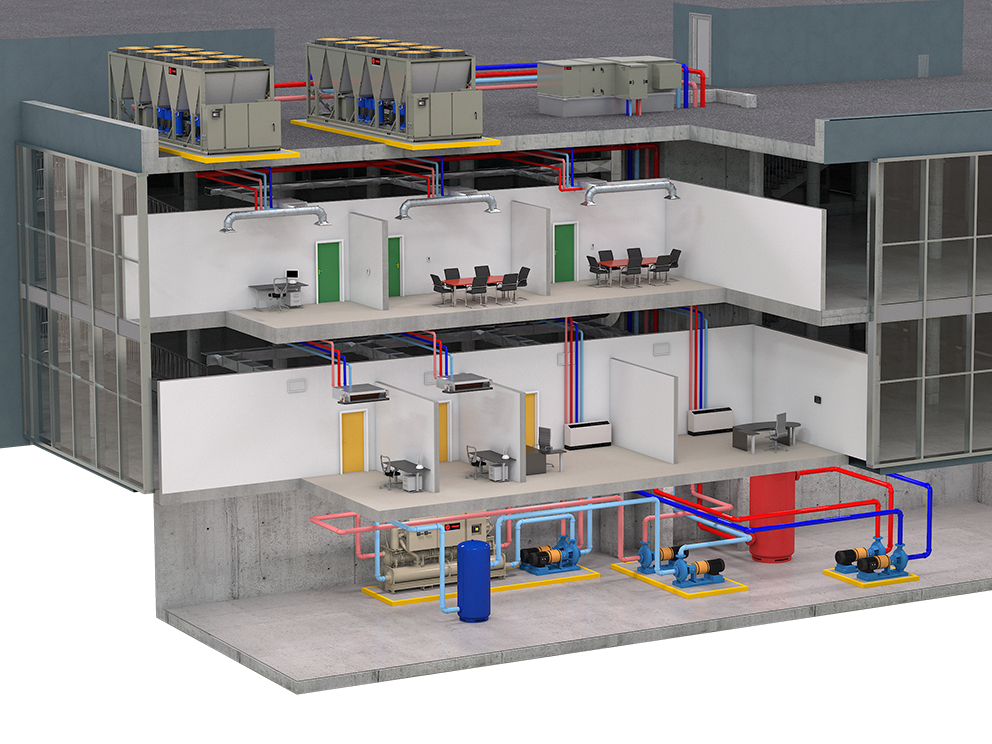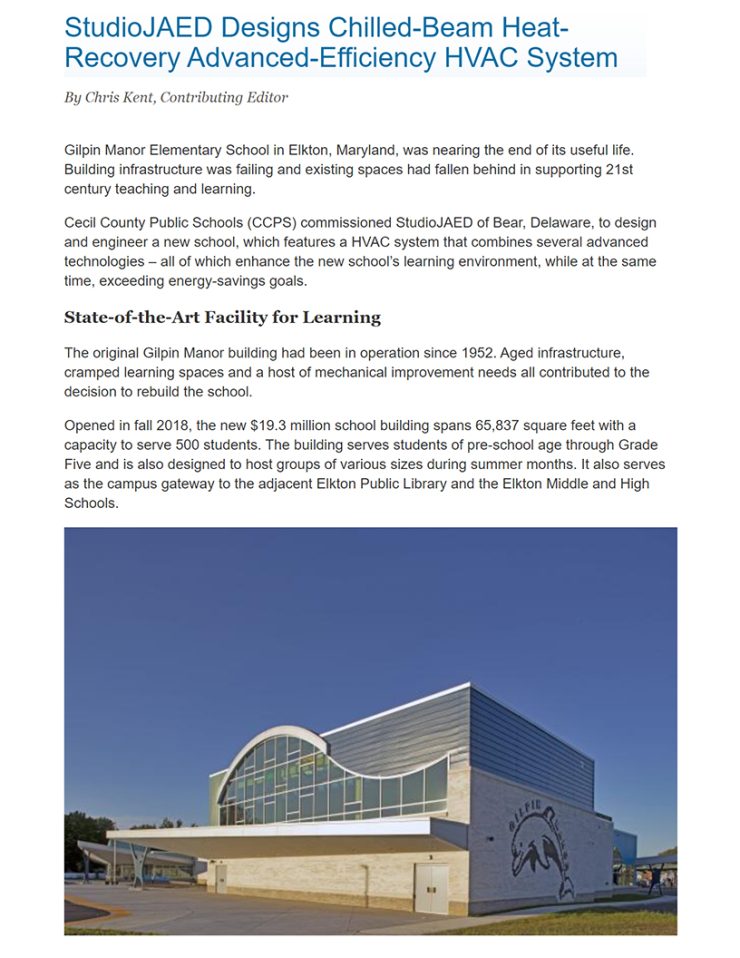Integrated HVAC systems are powered by a central unit managing heating and cooling for entire buildings. Typically, these units are installed on the roof in commercial settings.
Integrated HVAC systems unify heating, cooling, and air purification, ensuring energy efficiency and comfortable environments. With various types of HVAC systems available, such as split, hybrid, duct-free, and packaged units, it’s essential to understand their unique advantages and disadvantages to choose the most suitable option for your needs.
As experts in commercial and industrial HVAC solutions, we specialize in heating, air conditioning, ventilation, building-automation systems, and more, prioritizing efficient and effective climate control for our clients. Trust our experienced team to deliver top-notch integrated HVAC services tailored to your requirements.

Credit: www.facebook.com
What Is Integrated Hvac?
An Integrated HVAC system is a centralized unit that efficiently manages the heating and cooling requirements of an entire building. Typically installed on the roof of commercial facilities, these systems offer a comprehensive solution for climate control.
Definition
An Integrated HVAC system refers to a centralized unit that efficiently manages the heating and cooling needs of an entire building. These systems are often installed on the roof of commercial facilities and offer a comprehensive solution for climate control.
Comparison With Traditional Hvac
Integrated HVAC systems are distinguished from traditional HVAC systems by their centralized design that efficiently caters to the heating and cooling needs of an entire building. Unlike traditional systems that rely on separate units for different zones, integrated systems offer a more streamlined and energy-efficient approach to climate control.

Credit: www.trane.com
Types Of Integrated Hvac Systems
Integrated HVAC systems are essential for efficiently managing heating and cooling needs in buildings. Various types of integrated HVAC systems cater to different requirements, ensuring optimal comfort and energy efficiency.
Split Systems
A split system consists of two main components – an indoor unit and an outdoor unit. The indoor unit houses the evaporator coil, while the outdoor unit contains the compressor and condenser. Split systems are versatile and commonly used in residential and commercial settings.
Duct-free Systems
Duct-free systems, also known as ductless mini-split systems, do not require traditional ductwork for air distribution. These systems are ideal for spaces where ductwork installation is challenging. Duct-free systems offer flexibility and energy efficiency.
Hybrid Systems
Hybrid systems combine elements of both electric and gas-powered systems, providing a versatile solution for varying heating and cooling needs. These systems offer enhanced efficiency and can switch between energy sources based on demand, ensuring optimal performance.
Benefits Of Integrated Hvac
An integrated HVAC (Heating, Ventilation, and Air Conditioning) system offers numerous advantages for commercial and industrial settings. This advanced system seamlessly combines heating, cooling, ventilation, and air purification, providing unparalleled comfort and efficiency. Let’s delve into the key benefits of integrated HVAC:
Energy Efficiency
Integrated HVAC systems are designed to optimize energy use, reducing operational costs and environmental impact. By coordinating heating, cooling, and ventilation functions, these systems maximize efficiency, ensuring minimal energy wastage. The centralized control and advanced automation features enable precise monitoring and adjustment, further enhancing energy efficiency.
Improved Indoor Air Quality
One of the noteworthy benefits of integrated HVAC is its ability to enhance indoor air quality. The integrated air purification component effectively removes pollutants, allergens, and contaminants, fostering a healthier and more comfortable indoor environment. With superior ventilation and filtration, the system maintains optimal air quality, thereby promoting the well-being of occupants and minimizing the risk of respiratory issues.

Credit: bssinc.net
Integrated Hvac In Commercial Use
An integrated HVAC system is a centralized heating, ventilation, and air conditioning solution that efficiently caters to the needs of an entire commercial building. Typically, these systems are installed on the roof of the facility, serving multiple areas within the establishment. Integrated HVAC systems offer unique advantages for commercial applications, including industrial settings and energy-saving solutions.
Industrial Applications
Integrated HVAC systems are well-suited for industrial environments where large-scale heating and cooling are required. These systems can efficiently regulate temperatures in warehouses, factories, and manufacturing plants, ensuring optimal working conditions for employees and preserving the quality of products.
Additionally, integrated HVAC systems in industrial settings help regulate indoor air quality, minimizing the presence of dust, pollutants, and harmful gases. By maintaining a clean and healthy environment, integrated HVAC systems contribute to a more productive workforce and reduce the risk of respiratory illnesses.
Energy-saving Solutions
Integrated HVAC systems are designed with energy efficiency in mind, offering significant cost savings for commercial establishments. These systems employ advanced technologies such as variable-speed compressors, intelligent controls, and zoning capabilities, allowing for precise temperature control in different areas of the building.
By accurately regulating heating and cooling, integrated HVAC systems minimize energy waste and reduce overall energy consumption. This not only lowers utility bills but also reduces the environmental impact of the building by decreasing carbon emissions.
Moreover, integrated HVAC systems can be seamlessly integrated with building automation systems, enabling centralized control over various components such as lighting, security, and ventilation. This integration optimizes the overall efficiency of the building, providing a more sustainable and comfortable environment for occupants.
In conclusion, integrated HVAC systems play a vital role in commercial settings, particularly in industrial applications and energy-saving solutions. They offer efficient temperature regulation, improved indoor air quality, and substantial cost savings. Considering the long-term benefits and environmental advantages, integrated HVAC systems are an excellent choice for commercial establishments seeking optimal comfort, productivity, and sustainability.
Future Of Integrated Hvac
As technology continues to advance, the future of Integrated HVAC systems looks promising. These systems are revolutionizing the way we heat and cool our buildings, offering numerous benefits such as energy efficiency, cost savings, and improved comfort.
Smart Control Systems
One key aspect of the future of Integrated HVAC is the integration of smart control systems. These systems utilize advanced sensors, artificial intelligence, and machine learning algorithms to optimize the heating and cooling processes. With smart control systems, HVAC units can intelligently adjust settings based on factors like occupancy, temperature, and weather conditions. This not only improves comfort but also helps reduce energy consumption and costs.
Integration With Renewable Energy Sources
Another exciting development in the future of Integrated HVAC is the integration with renewable energy sources. As the world strives for sustainable solutions, HVAC systems are also adapting. Integrated HVAC systems can now be configured to work seamlessly with solar panels, geothermal systems, and other renewable energy sources. This integration allows for greater energy efficiency, reducing reliance on traditional fossil fuels and minimizing the carbon footprint of buildings.
By harnessing the power of renewable energy, Integrated HVAC systems can significantly reduce energy costs over time while also contributing to a greener and more sustainable future.
Overall, the future of Integrated HVAC is bright. With advancements in smart control systems and integration with renewable energy sources, these systems have the potential to transform the way we heat and cool our buildings. From improved energy efficiency to cost savings and environmental benefits, Integrated HVAC systems are paving the way towards a more sustainable and comfortable future.
Frequently Asked Questions On Integrated Hvac
What Is An Integrated Hvac System?
An integrated HVAC system is driven by a central unit, handling heating and cooling for an entire building, commonly mounted on the building’s roof.
What Is Integrated Air Conditioning System?
An integrated air conditioning system combines air conditioning, ventilation, and air purification for optimal comfort and energy efficiency.
What Are The Four 4 Main Types Of Hvac Systems?
The four main types of HVAC systems are split systems, hybrid systems, duct-free systems, and packaged heating and air systems. Each has its own advantages and considerations to help you choose the best one for your needs.
What Is The Most Expensive Hvac System?
The most expensive HVAC system is an integrated HVAC system, which combines heating, cooling, and air purification. This centralized unit caters to the entire building’s needs.
Conclusion
In today’s fast-paced environment, Integrated HVAC systems are essential for maintaining a comfortable and efficient indoor climate. With the ability to control heating and cooling seamlessly, these systems offer significant benefits for both residential and commercial properties. By integrating the various components of HVAC, such as air conditioning, ventilation, and air purification, an integrated system ensures energy-savings and healthy living spaces.
With the expertise of skilled professionals, such as Integrated HVAC Systems & Services, Inc. , buildings can enjoy optimal performance and enhanced comfort. So, whether you are in Austin, Texas or any other location, considering an integrated HVAC system can significantly improve the functionality of your property.
